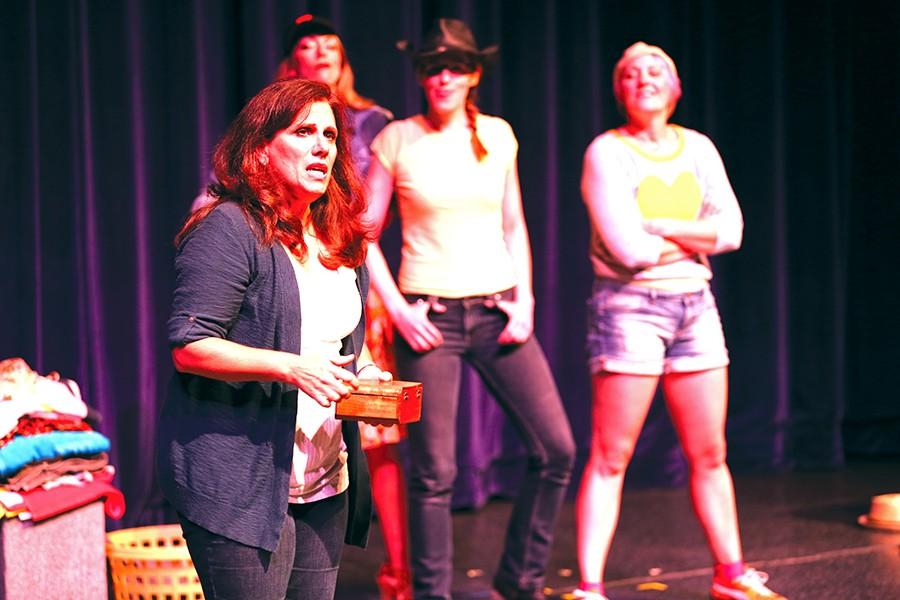‘Empowering Women’ recognizes female struggles
(Far left) Janis Bergmann performs the play “Yellow” during the Union Women Actors’ Coalition (UWAC) in the Knox Center on Monday.
Sep 23, 2015
The Union Women Actors Coalition’s (UWAC) presented various short stories in its showing of “Empowering Women”, in the Knox Center at 8 p.m. on Monday to raise support for female theater artists throughout the Bay Area.
The UWAC was created by a group of women taking part of the Actor’s Equity Association (AEA), a labor union representing actors and stage managers in theater, who were concerned about the limited opportunities that women have, not only in theater, but their struggle living in a patriarchal society.
Chairperson of UWAC Susan Shay said the Saturday before the play, five playwrights were given a prompt themed “Empowering Women,” and were given only 24 hours to create a 10-minute play.
The playwrights then turned over their scripts to their team of directors and actors to read overnight, rehearse and perform.
“I was glad to see the plays were about relevant issues in today’s life, but were also sadly historical,” San Mateo resident Josiah Polhemus said.
Polhemus said it was beneficial for people of different ages in the audience to experience events depicted in the plays under the umbrella title “Empowering Women.”
The five empowering plays depicted different situations women encounter throughout their lifetime.
These plays were: “Mind the Gap” by playwright Madeline Puccioni, which highlighted the inequalities women faced in the workforce; “What Price Beauty” by playwright Lynne Kaufman which focused on the extremes women go through to meet society’s expectations of beauty; “Queen Leara” by playwright Torange Yeghiazarian, which showed the trauma and shame rape victims go through in their search for justice; “Ourstory” by playwright Betty Shamieh, which was based on how society would be different through a matriarchal lens; and “Yellow” by Kirsten Brandt which demonstrated the fear women have of walking alone and being “catcalled” or overtly sexualized and having to smile through their degradation.
The actress’ passion about the content was clearly felt by the audience as they each brought their characters to life once the spotlight hit.
The audience responded with laughter during the occasional comical ironies such as seeing the world through a matriarchal perspective in the play “Ourstory”, which is set in the year 3015.
The audience also listened attentively in silence while the more intense situations occurred such as in the actress’ suffering in “Queen Leara”, which showed how women who were victims of rape are forced into not speaking out due to fear of being silenced by patriarchal pressures that control society.
Focusing on real life concepts that impact women on more than an emotional and social level, Oakland resident John O’Hagan said having the chance to see women in theater perform powerful stories hit home because of the reality of the situations.
In the play “Yellow,” the different encounters showed how women and young girls are harassed on a day-to-day basis by having the women switch roles with men in catcalling scenarios.
The underlying message in the series of plays was directed toward women who are afraid of speaking out against their assailants to rise above societal pressures as well as to raise awareness about issues women face.
Audience member Camilla Ford said having her 15-year-old daughter learn about women empowerment made her feel “proud” because women and many other young girls, may have to face in their lifetimes.
Shay said more than 50 percent of ticket sales were from women. Tickets were $25 at the door and $15 if bought beforehand.
While profits and donations are accumulated for the CCC Foundation scholarship for theatre students and engaged equity guest artists, a portion of the ticket is tax deductible.
“We don’t feel like there are enough equity women on stage and backstage to promote women’s work,” Shay said.
Part of the audience in support included actor Oakland resident Megan Kilian said she expected the play to be successful because of the experienced actors and playwrights.



